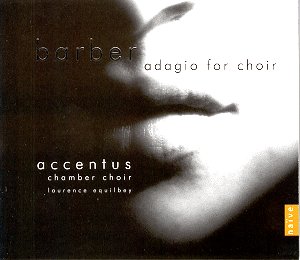Laurence Equilbey and Accentus have a fine pedigree
across the musical spectrum, from Sibelius to Boulez, and though
those of different tendencies may have reported otherwise, I am
happy to concur with Gramophone and the BBC on this excellent
disc. The thoughts of Wolf and Chopin arranged for choir didn't
exactly get my heart racing but the whole programme turned out
to be ingeniously devised and executed. Barber's Adagio
is virtually indestructable, whether in typical orchestral format,
my preferred original string quartet movement guise or the increasingly
familiar choral transcription by the composer himself included
here. Would it that Black Hawk Down would do for Breton
folk singer Denez Prigent's Gortoz A Ran what Platoon
did for Barber's immortal piece.
Maintaining the film theme, the last (re)arrangement
of Bach's Come Sweet Death I heard was a brilliant one
for guitar on a soundtrack by jazz guitarist Pat Metheny. Knut
Nystedt's version for choir is one of the highlights of the record,
despite its unnecessary and trite retitling as Immortal Bach.
This also perhaps illustrates the broadness of Equilbey's conception
of "romantic masterpieces" as a continuum running all the way
from Johann Sebastian through to Alban Berg, a rather more expanded
view than perhaps the prevailing one admits. The Mahler pieces
were, I suppose, obvious choices but I have to say that the exchange
of harp and strings for choral textures in the famous Adagietto
is one I regarded as a breath of musical fresh air not as a sacrilegious
act. I also welcomed the gorgeous interpretations of Ravel and
Debussy, being a great admirer of the quintessential French composers'
use of choral forces in Daphnis and the final Nocturne,
respectively. The closing Chopin transcription is an absolutely
exquisite lullaby, not a million miles removed from the less austere
inspirations of the latest generation of Baltic composers, Vasks,
Tormis etc. On this evidence, a similar treatment of the Grieg
solo piano music could be revelatory. Despite the rather corporate
cover, this CD turns out to be anything but a populist gimmick
- I could name many discs released this year that offer a far
more mundane listening experience. All power to Accentus, I look
forward to hearing its back catalogue and future releases alike.
Thank you for ears and mind opened! No tunnel vision here!
Neil Horner
Gwyn Parry Jones also listened to this disc
What is this obsession with very S—L—O—W
music? The stores are full of CDs entitled ‘Adagio’ or ‘Your 10
best slow movements’ etc. Here comes another, eleven tracks of
mostly intense late Romantic music for unaccompanied choir, and
I confess it eventually made me feel quite queasy. The Accentus
Chamber Choir from France are a splendid outfit – they’d have
to be even to attempt much of this music in the recording studio
– and their conductor Laurence Equilbey brings a great commitment
to everything she and they do together.
But that cannot prevent the essential weakness
of many of these arrangements from becoming apparent. The collection
begins with Barber’s famous Adagio in its choral version
as Agnus Dei. This arrangement was of course made by the
composer himself, and is very beautiful and successful, though
this version is overripe and unsubtle compared to that of The
Corydon Singers (under Matthew Best on Hyperion) who stress the
music’s nobility rather than wallowing in its sentiment. You’ll
search in vain for any truly pianissimo singing here.
From there on, in terms of the music, things
get worse; it was a pretty odd idea to make a choral arrangement
of the Mahler "Adagietto" from Symphony no.5.
Converting this movement from orchestral to choral texture
proves to be an interesting but doomed experiment, principally
because the composer’s conception of the work is quintessentially
instrumental. The sound of strings and harp is fundamental to
the nature of this music, and the choir, despite its fine singing,
can do nothing to overcome that problem. Much the same applies
to the setting found on track 9 of the wonderful solo song Ich
bin der Welt abhanden gekommen
Admittedly, the soaring soprano of Solange Anorga
in the first Mahler piece is quite something, but it doesn’t rescue
this number from the aura of ‘kitsch’ that it produces. Much the
same holds for the remaining tracks, which are mostly arrangements
of piano music or solo songs. There is, thank heavens, one moment
of blessed relief, which coincidentally is also the one moment
of genuine originality. This is supplied by track 3, unpromisingly
called Immortal Bach. This is a re-creation by Knut Nystedt
of Bach’s chorale Komm süsser Tod, complete with what
sounds like a bird twittering high up in the roof of the
Arsenal Hall. Nystedt has blurred the outlines of the chorale
with some brilliantly resourceful choral writing, creating some
haunting and memorable effects. Disappointingly, the booklet notes
have nothing whatever to say about this interesting item or its
recording.
Other than that track and the Barber which gives
the CD its title, I fear that I found this a well performed but
fundamentally ill-conceived issue.
Gwyn Parry-Jones
